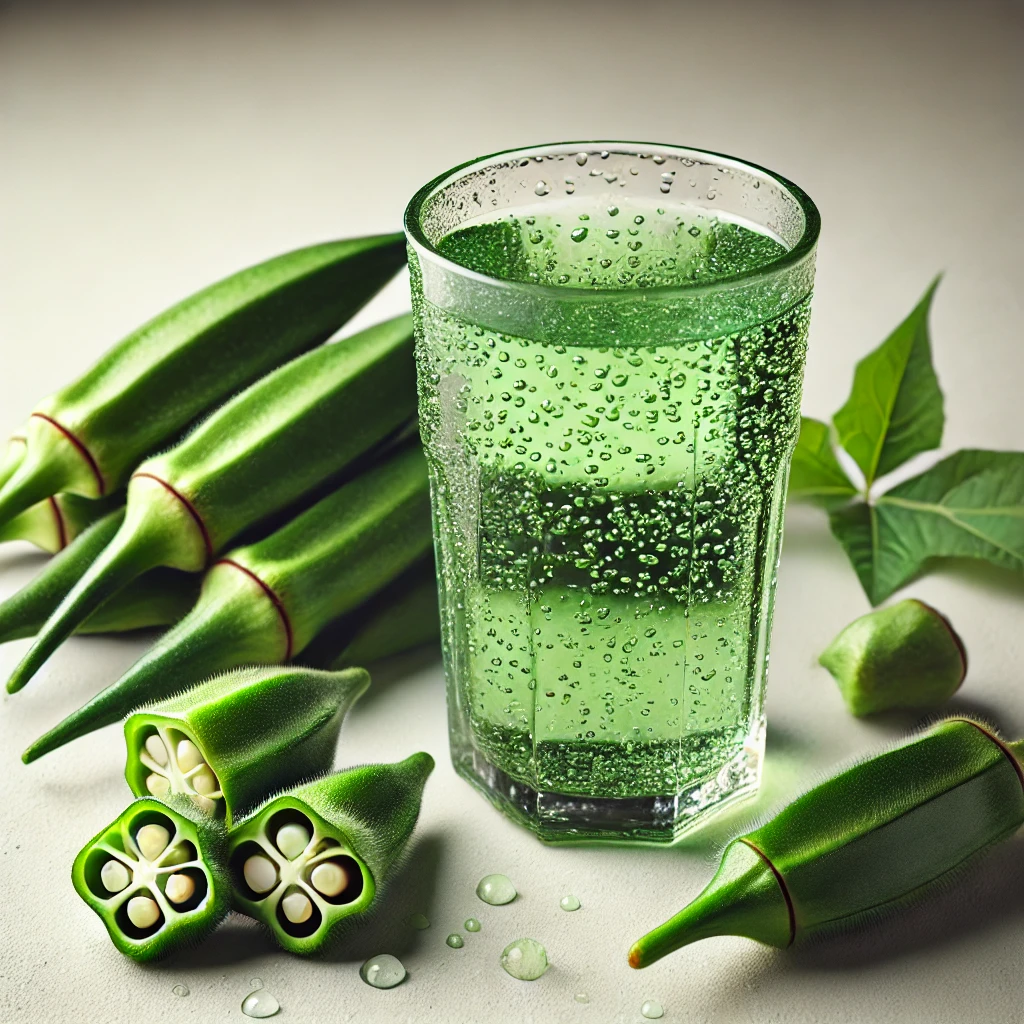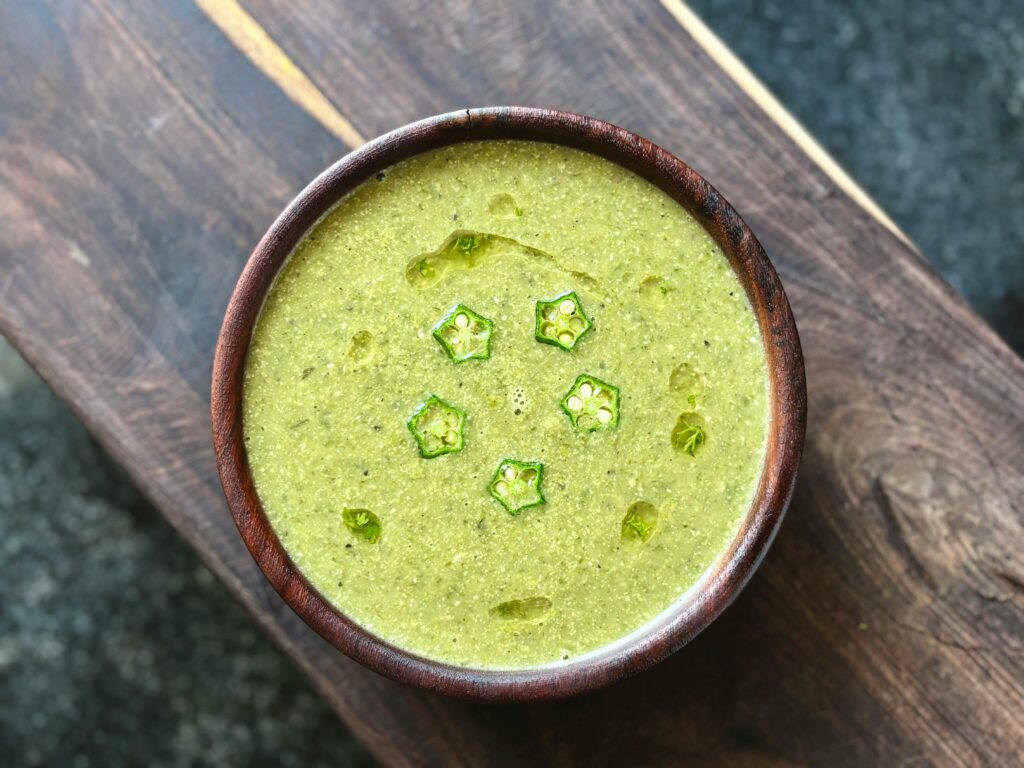Table of Contents
ToggleThe Benefits of Okra Water
In the realm of wellness and food trends, there’s always something new being touted as the next miracle drink. Okra water benefits are now gaining attention, alongside the popular lemon water and artichoke water, each with its own health claims from boosting metabolism to aiding digestion. Okra water health benefits are especially seeing a surge, with a 470% spike in interest reported by Pinterest. On social media platforms like TikTok and Instagram, the benefits of drinking okra water are widely shared, including claims of improved digestion, blood sugar regulation, enhanced fertility, increased vaginal lubrication, and even easing labor for pregnant women. But what are the real health benefits of okra water, and does it truly live up to the hype?
What is Okra Water
Okra, known scientifically as Abelmoschus esculentus, is a vegetable prized for its unique texture and nutrient profile. It’s particularly high in plant mucilage, a type of slimy, soluble fiber that’s also found in foods like chia seeds and seaweeds. This mucilage forms a gel-like substance when mixed with water. According to Chelsea Rae Bourgeois, a registered dietitian and nutritionist, “Mucilage absorbs the liquid and forms a gel-like substance, just like it would in your digestive tract.” This property is what gives okra water its slippery, viscous texture and potentially contributes to its health claims.

How to Make Okra Water
Creating okra water is simple:
- Wash and slice two or three medium-sized okra pods.
- Soak the slices in a glass of water overnight, or for at least 8-12 hours.
- Drink the water in the morning on an empty stomach for best results.
You can also eat the okra slices after soaking, though their texture may be less appealing once waterlogged. Pan-frying them post-soaking is an option, though it might not improve their taste significantly.

Nutritional Profile of Okra
Okra is a nutritional powerhouse. It contains vitamins C and K, potassium, magnesium, and folate. Folate is particularly beneficial for pregnant women, as it plays a crucial role in fetal development. However, it’s important to note that the nutrient content of okra water may not be as robust as consuming the entire vegetable. “If you’re not actually eating the okra slices from your water, you’re missing out on a chunk of those nutrients,” Bourgeois notes, including the insoluble fiber and protein found in the seeds.

Health Claims and Evidence
The rise of okra water as a wellness trend is accompanied by various health claims that range from digestion aid to blood sugar regulation. While some of these assertions are rooted in the natural properties of okra, it’s important to examine the scientific evidence supporting them. Okra is rich in nutrients and contains properties that may offer health benefits, but the effectiveness of consuming okra water specifically needs further exploration. Here’s a closer look at some of the most discussed health claims:
Improving Digestion
Okra water is lauded for its potential to enhance digestion, mainly due to its mucilage content. Mucilage is a type of soluble fiber that becomes gel-like when combined with water. This can help add bulk to stool and facilitate smoother movement through the digestive system, potentially alleviating constipation. The gel-like substance acts as a natural lubricant in the intestines, allowing waste to pass more easily and reducing bloating. Although drinking okra water might provide some relief, consuming the entire vegetable, which contains both soluble and insoluble fiber, provides more substantial digestive benefits.
Soluble fiber found in the mucilage can also support the growth of healthy gut bacteria, contributing to better overall digestive health. When the whole vegetable is eaten, the combination of fibers helps promote a balanced gut environment, making digestion more efficient and comfortable.
Regulating Blood Sugar
Another health claim associated with okra water is its potential to help regulate blood sugar levels. This is attributed to okra’s soluble fiber content, which can slow down the absorption of sugar in the digestive tract. By reducing the rate at which sugar enters the bloodstream, okra water may assist in preventing spikes in blood glucose, which is particularly valuable for those managing diabetes or pre-diabetic conditions. While some animal studies show promise, more human clinical trials are needed to confirm these effects.
Consuming okra water can complement a healthy diet, but incorporating whole okra or other high-fiber foods, like beans and vegetables, would provide more comprehensive blood sugar benefits. Whole okra includes additional nutrients such as polyphenols and antioxidants, which can further aid in blood sugar management.

Enhancing Fertility and Easing Labor
Social media platforms are abuzz with claims that okra water can enhance fertility, improve vaginal lubrication, and even make labor easier for expectant mothers. These assertions are likely based on a mix of folklore and the fact that okra contains certain beneficial compounds. Folate, an essential vitamin for reproductive health, is present in okra. Adequate folate intake is crucial for pregnant individuals to prevent neural tube defects and support overall fetal development. However, the amount of folate transferred to okra water is minimal compared to consuming the vegetable itself or other folate-rich foods such as spinach and legumes.
The idea that okra water could ease labor or improve vaginal lubrication draws on an old belief called the doctrine of signatures, which suggests that foods with certain physical qualities influence similar attributes in the body. While this concept has been culturally significant, it is not scientifically proven. Modern research does not support the idea that drinking okra water specifically can facilitate childbirth.
Antioxidant and Hydration Benefits
Okra is known for its antioxidant content, including compounds like vitamin C and flavonoids that help fight free radicals and reduce oxidative stress. While okra water may retain some antioxidants, the levels will be far lower than in the whole vegetable. However, drinking okra water can still contribute to overall hydration, which is essential for maintaining bodily functions and supporting cellular health.
Limitations and Considerations
While okra water has potential benefits, it is not a cure-all. The primary benefits of consuming okra come from eating the whole vegetable, not just the infused water. By steeping okra and only drinking the water, you miss out on:
- Insoluble fiber: which is crucial for digestive health.
- Protein: found in okra seeds.
- Micronutrients: not all of which may leach into the water.
Those considering okra water as a way to enhance fertility, ease labor, or boost overall health should consult with healthcare providers and consider it as part of a broader, balanced diet.

The Verdict: Is Okra Water Worth the Hype?
While okra water may have some benefits, particularly for digestion and potential blood sugar regulation, it should be approached as a complementary practice rather than a primary health intervention. The exaggerated claims found on social media, such as enhancing fertility or easing labor, often lack the scientific backing to be considered reliable. Drinking okra water won’t replace prenatal vitamins or more nutrient-dense food options.
In summary, okra water is worth trying if you’re curious and seeking mild digestive benefits, but it’s not a magic bullet for health. Eating whole, nutritious foods, including whole okra, will provide more comprehensive health advantages. Stay informed and make decisions based on balanced, evidence-based information.

To learn more about how frozen vegetables compare to fresh ones and their nutritional value, check out our detailed post on Are Frozen Vegetables as Healthy as Fresh?




Pingback: Are Frozen Vegetables as Healthy as Fresh? - TotalWellbeingblog.com
Pingback: Flaxseeds Benefits: Unlock the Power of This Nutritional Superfood - TotalWellbeingblog.com
Have you ever thought about adding a little bit more than just your articles? I mean, what you say is fundamental and all. Nevertheless imagine if you added some great pictures or video clips to give your posts more, “pop”! Your content is excellent but with images and videos, this blog could undeniably be one of the most beneficial in its niche. Excellent blog!